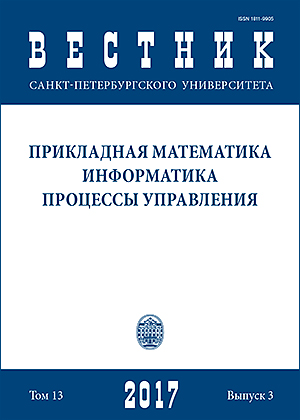Lyapunov matrices for a class of systems with exponential kernel
DOI:
https://doi.org/10.21638/11701/spbu10.2017.301Abstract
The problem of computation of Lyapunov matrices arises when Lyapunov—Krasovskii functionals are applied for stability analysis of linear time-invariant delay systems. A Lyapunov matrix is a solution of a matrix time-delay differential equation that satisfies two special conditions. It was shown that there exists a unique Lyapunov matrix if and only if the Lyapunov condition is satisfied, i. e. time-delay system has no eigenvalues symmetric with respect to the origin. Nevertheless, computational methods for Lyapunov matrices exist only for several classes of time-delay systems. In this contribution, we study time-delay systems with distributed delay and exponential kernel. In a contribution of Kharitonov, the problem of finding a Lyapunov matrix for this class of time-delay systems was reduced to the computation of solutions to an auxiliary delay-free system of ordinary differential equations with boundary conditions. However, the boundary conditions that were proposed earlier are not sufficient for the uniqueness of solutions to the auxiliary system, and results reported in the paper by Kharitonov do not allow us to obtain the Lyapunov matrix from a solution to an auxiliary system. These substantial differences between this class of time-delay systems and the wellstudied class of linear systems with one delay arise from ambiguity in the choice of boundary conditions for the auxiliary system. In this paper we propose a new set of boundary conditions that allows us to develop a theory similar to that of systems with one delay. It is shown that a solution of the auxiliary system with the new boundary conditions allows us to obtain the Lyapunov matrix. It is established that the auxiliary system admits a unique solution if and only if the Lyapunov condition is satisfied. Thus, one can verify existence and uniqueness of the Lyapunov matrix during its construction. Refs 12.
Keywords:
time-delay systems, Lyapunov matrix
Downloads
References
References
Downloads
Published
How to Cite
Issue
Section
License
Articles of "Vestnik of Saint Petersburg University. Applied Mathematics. Computer Science. Control Processes" are open access distributed under the terms of the License Agreement with Saint Petersburg State University, which permits to the authors unrestricted distribution and self-archiving free of charge.






